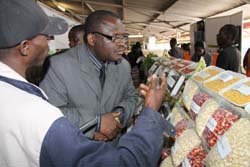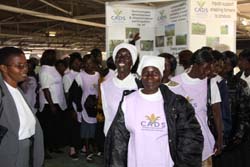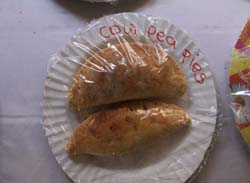Zimbabwe Adding Value to Sustainable Agriculture (ZAVSAP) is a network of 9 local NGOs in Zimbabwe that promotes agro-processing, utilization and marketing of processed products among smallholder farmers of Zimbabwe. Three of the 9 member NGOs are N2Africa partners: Cluster Agriculture Development Services (CADS), Community Technology Development Trust (CTDT) and the Lower Guruve Development Association (LGDA). ZAVSAP organized a Processed Products Fair in Harare on the 15th and 16th of July, 2011. All the three organisations facilitated the attendance of their beneficiaries at the Fair which has now become an annual event. The fair was held under the theme “Processed products for healthy living and improved livelihoods”.
The fair was officially opened by the Deputy Minister of Health who said “While food processing still has the main objective of providing a safe nutritious diet in order to maintain health, other aspects, particularly the generation of income for the producer and seller, have become increasingly important. The overall potential of agroprocessing and marketing is huge. It can reduce wastage, enhance food security, improve livelihoods for low-income groups and empower women.”
 |
Figure 1: Guest of Honour Minister of Health, Dr. Henry Madzorera |
 |
CADS facilitated catering of traditional lunches during the two-day event. The menu included various products made from legume crops such as sugar free cakes, snacks, cowpeas and sweet potato muffins, pies and fritters.
Farmers showcased various products they grow varying from cereals to legumes and horticultural crops. There were over 60 unprocessed and 200 processed products at the CADS stand-alone. Some of the products on display were also available for sale.
Over the years, farmers have reverted to traditional foods as a way to combat malnutrition as well as to mitigate the impacts of HIV and AIDS. Farmers came from far to share experiences, to learn from their peers and to explore market opportunities for their products. The fair was held also to promote marketing of agricultural produce as a livelihood option. A total of 750 people had attended the fair by the end of the second day. CADS is also promoting the introduction of traditional foods in the diets of institutions such as schools, hospitals and prisons. The aim is to influence consumption patterns so that families can also include traditional foods in their diet. Some of the legumes produced in Goromonzi district were donated to Chikwaka district hospital. CADS has initiated value addition trainings to enable farmers to add value to crops and improve nutrition at the household level.
 |
 |
Figure 2: Traditional foods in daily diets |
The farmers are now able to make various products from soya beans such as pies, fritters, mince and coffee. They also make a sweet potato drink and groundnut cakes and muffins. Men are also being targeted and they are participating in greater numbers in the value addition trainings. Zimbabweans are increasingly becoming aware of the need to eat healthy foods to enhance household nutrition security.
CTDT is promoting the use of solar drying on legume vegetable crops to avoid loss of nutrients through direct sun bleaching. This is achieved through the use of a metal solar drier which was developed 9 years ago with the input of local farmers. Development of the solar drier was stimulated by the need to preserve vegetables for long periods before use. Farmers working with CTDT also showcased different processed products that are produced from soya beans, sugar beans and cowpeas. These included traditional foods such as cowpea fitters, rupiza (grinded cowpea), mutakura (boiled maize with groundnuts or cowpeas or bambaranuts), and solar dried cowpea vegetable leaves among others.
 |
 |
 |
|
Figure 3: New products produced by farmers |
Farmers from Guruve district had their products to showcase and for sale: this demonstrated the usefulness for farmers to be trained in agro-processing.
From this food fair, it was discovered that there is need for farmers to learn new ways of processing their products for value addition and find output markets where they could sell their products.
Catherine Chahweta (CADS) and Isaac Chabata (N2Africa)
